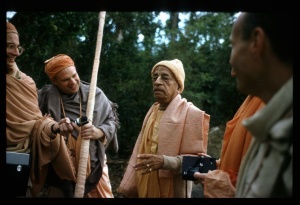CC Antya 5.122 (1975): Difference between revisions
(Vanibot #0027: CCMirror - Mirror CC's 1996 edition to form a basis for 1975) |
(Vanibot #0020: VersionCompareLinker - added a link to the Version Compare feature) |
||
| Line 2: | Line 2: | ||
<div style="float:left">'''[[Sri Caitanya-caritamrta (1975)|Śrī Caitanya-caritāmṛta (1975)]] - [[CC Antya (1975)|Antya-līlā]] - [[CC Antya 5 (1975)|Chapter 5: How Pradyumna Miśra Received Instructions from Rāmānanda Rāya]]'''</div> | <div style="float:left">'''[[Sri Caitanya-caritamrta (1975)|Śrī Caitanya-caritāmṛta (1975)]] - [[CC Antya (1975)|Antya-līlā]] - [[CC Antya 5 (1975)|Chapter 5: How Pradyumna Miśra Received Instructions from Rāmānanda Rāya]]'''</div> | ||
<div style="float:right">[[File:Go-previous.png|link=CC Antya 5.121 (1975)|Antya-līlā 5.121]] '''[[CC Antya 5.121 (1975)|Antya-līlā 5.121]] - [[CC Antya 5.123 (1975)|Antya-līlā 5.123]]''' [[File:Go-next.png|link=CC Antya 5.123 (1975)|Antya-līlā 5.123]]</div> | <div style="float:right">[[File:Go-previous.png|link=CC Antya 5.121 (1975)|Antya-līlā 5.121]] '''[[CC Antya 5.121 (1975)|Antya-līlā 5.121]] - [[CC Antya 5.123 (1975)|Antya-līlā 5.123]]''' [[File:Go-next.png|link=CC Antya 5.123 (1975)|Antya-līlā 5.123]]</div> | ||
{{CompareVersions|CC|Antya 5.122|CC 1975|CC 1996}} | |||
{{RandomImage}} | {{RandomImage}} | ||
==== TEXT 122 ==== | ==== TEXT 122 ==== | ||
| Line 11: | Line 10: | ||
<div class="verse"> | <div class="verse"> | ||
:īśvarera nāhi kabhu deha-dehi-bheda | :īśvarera nāhi kabhu deha-dehi-bheda | ||
:svarūpa, deha, | :svarūpa, deha,--cid-ānanda, nāhika vibheda | ||
</div> | </div> | ||
| Line 18: | Line 17: | ||
<div class="synonyms"> | <div class="synonyms"> | ||
īśvarera—of the Supreme Personality of Godhead; nāhi—there is not; kabhu—at any time; deha-dehi-bheda—distinction between the body and | īśvarera—of the Supreme Personality of Godhead; nāhi—there is not; kabhu—at any time; deha-dehi-bheda—distinction between the body and soul; svarūpa—personal identity; deha—body; cit-ānanda—all made of blissful spiritual energy; nāhika vibheda—there is no distinction. | ||
</div> | </div> | ||
| Line 25: | Line 24: | ||
<div class="translation"> | <div class="translation"> | ||
"At no time is there a distinction between the body and soul of the Supreme Personality of Godhead. His personal identity and His body are made of blissful spiritual energy. There is no distinction between them. | |||
</div> | </div> | ||
| Line 32: | Line 31: | ||
<div class="purport"> | <div class="purport"> | ||
Lord Kṛṣṇa, the son of Nanda Mahārāja, is advaya-jñāna; in other words, there is no distinction between His body and | Lord Kṛṣṇa, the son of Nanda Mahārāja, is advaya-jñāna; in other words, there is no distinction between His body and soul, for His existence is completely spiritual. According to the verse from Śrīmad-Bhāgavatam beginning with the words vadanti tat tattva-vidas tattvam (1.2.11), the Absolute Truth is always to be understood from three angles of vision as Brahman, Paramātmā and Bhagavān. Unlike the objects of the material world, however, the Absolute Truth is always one and always the same. Thus there is no distinction between His body and soul. His form, name, attributes and pastimes, therefore, are completely distinct from those of the material world. One should know perfectly well that there is no difference between the body and soul of the Supreme Personality of Godhead. When one conceives of a distinction between His body and soul, one is immediately conditioned by material nature. Because a person in the material world makes such distinctions, he is called baddha-jīva, a conditioned soul. | ||
</div> | </div> | ||
Latest revision as of 02:23, 27 January 2020

A.C. Bhaktivedanta Swami Prabhupada
TEXT 122
- īśvarera nāhi kabhu deha-dehi-bheda
- svarūpa, deha,--cid-ānanda, nāhika vibheda
SYNONYMS
īśvarera—of the Supreme Personality of Godhead; nāhi—there is not; kabhu—at any time; deha-dehi-bheda—distinction between the body and soul; svarūpa—personal identity; deha—body; cit-ānanda—all made of blissful spiritual energy; nāhika vibheda—there is no distinction.
TRANSLATION
"At no time is there a distinction between the body and soul of the Supreme Personality of Godhead. His personal identity and His body are made of blissful spiritual energy. There is no distinction between them.
PURPORT
Lord Kṛṣṇa, the son of Nanda Mahārāja, is advaya-jñāna; in other words, there is no distinction between His body and soul, for His existence is completely spiritual. According to the verse from Śrīmad-Bhāgavatam beginning with the words vadanti tat tattva-vidas tattvam (1.2.11), the Absolute Truth is always to be understood from three angles of vision as Brahman, Paramātmā and Bhagavān. Unlike the objects of the material world, however, the Absolute Truth is always one and always the same. Thus there is no distinction between His body and soul. His form, name, attributes and pastimes, therefore, are completely distinct from those of the material world. One should know perfectly well that there is no difference between the body and soul of the Supreme Personality of Godhead. When one conceives of a distinction between His body and soul, one is immediately conditioned by material nature. Because a person in the material world makes such distinctions, he is called baddha-jīva, a conditioned soul.